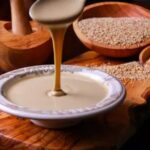More pertinent issues like health, ethical, and environmental factors make vegan coffee more than just another dairy free option. It is a growing trend that many are adopting. This guide provides details that are vital for readers to help transform their habitual coffee routine into one that is eco-friendly and aligned with vegan standards. Consider this an introductory guide to enable you to make better conscious and self-assured choices.
What is Vegan Coffee?
The Basics: Ingredients That Make Coffee Vegan
Simply put, black coffee is the most basic form of vegan coffee – simply brewed roasted beans and water. However, adding any of the two dozens of available creamers and flavored syrups often brings into the mixture animal products. Ingredients added after beans are what determines the “vegan” status of coffee. Flavored milks, creamers, sweeteners, etc., need to be checked for their ingredients prior to blend as well.
Vegan coffee means any derivative of coffee processed with solely botanical and synthetic components. These components include non-dairy creamers, and milk analogs, syrups devoid of honey, dairy or any animal product.
Non-Vegan Substances to Consider
There are various animal-based ingredients that are added to many coffee beverages. Dairy milk is probably the most notorious ingredient and others include syrups, flavored syrups like caramel or white chocolate that could contain milk solids. Specialty lattes also tend to have whipped cream, which is another dairy product.
Some non-vegan dairy creamers marketed as “non-dairy” could contain casein, a milk derivative. Other non-vegan ingredients outside casein include gelatin, and certain artificial food colorings. With the right questions at coffee shops and reading brands carefully, you can ensure your coffee remains cruelty-free.
For Coffee Enthusiasts, The Available Non-Dairy Milk Types
Almond, Oat, Soy and Beyond
Currently, the market is flooded with non-dairy milks, which is good for consumers as each offers various advantages. A few examples include almond milk, which has a light and nutty flavor, soy milk which is a thicker beverage with higher proteins, and oat milk, which is creamy and sweet. Consumers can also enjoy coconut milk, cashew milk, and rice milk alongside newer pea milks.
The selection stems from personal favorites and how the milk performs during frothing. A good example is oat milk because of its popularity due to its ease of being steamed.
How Different Milks Affect Flavor and Texture?
Every type of plant-based milk alters the taste and texture of coffee differently. While oat milk accentuates the sweetness of coffee, almond milk may lead to a slightly bitter or thin finish. Soy milk, on the other hand, offers a neutral flavor paired with creamy body. Coconut milk has a distinct flavor that is best suited for iced coffee or dessert beverages.
Textural properties, such as ease of frothing, also matter. For those who enjoy lattes or cappuccinos, some froth more easily than others. Many plant-based milks marketed for baristas are designed to be steamed and froth like dairy.
Best Vegan Coffee Brands and Beans
Identifying Vegan-Friendly Roasts
Although coffee beans are inherently vegan, their processing might not be. Certain flavored beans, particularly those with names reminiscent of desserts such as vanilla cream, Irish cream, or hazelnut latte, may use non-vegan ingredients. Try to source coffee that has transparent ingredient listings and avoid brands claiming to be vegan-friendly.
Roasts labeled as “single-origin,” “organic,” or “fair trade” are often marketed for their quality and ethical sourcing which tend to align with values many vegan consumers care about.
Ethical and Sustainable Coffee Sourcing
Veganism aims to reduce harm to both living beings and the environment, among other adopters, which is why many ethically-vegan coffee drinkers extend their dietary considerations to the vegan-options-oriented coffee. Certifications such as Fair Trade, Rainforest Alliance, and Direct Trade assure customers that the coffee was grown with minimal ecological footprint and under humane working conditions.
Eco-friendly packaging is another factor contributing to an ethical coffee experience. Supporting brands that concern themselves with these additional factors augments sustainable ecological practices.
Making Vegan Coffee at Home
Tips for Brewing the Perfect Vegan Cup
For most people, brewing coffee at home is very easy once they know exactly where to begin. Buying fresh, whole beans that can be ground before brewing will always produce a better tasting brew. The use of clean equipment and filtered water will yield the best flavored brew.
For those who prefer cappuccinos and lattes, buying a milk frother specialized for plant-based alternatives will be very useful. These products include Barista-style oat, almond and soy milks which froth and steam very well. Sweeteners should be maple syrup, agave, or sugar that is vegan friendly.
Further, you can use a French press, pour-over, or AeroPress to experiment with different coffee brewing techniques. Pairing the coffee with plant-based milk heightens the experience.
Tools and Products That Help
Each vegan coffee tool has its unique advantages. A good quality grinder improves the texture of coffee grounds ensuring they are uniform which is critical for even brewing. Reusable filters and eco-friendly stainless steel pods along with other accessories align well with the sustainable goals of vegan living.
In addition, there is an array of vegan creamers, flavored syrups, and coffee blends that complement a plant-based diet. These ensure that with a few compromises, rich and flavorful coffee can still be enjoyed.
Ordering Vegan Coffee at Cafés
What to Ask to Avoid Non-Vegan Ingredients?
In general, ordering vegan coffee is not difficult as long as a few simple questions are asked. For clarification, always ask if the milk is plant-based and what type is used. Some cafes offer plant-based options at no cost while others charge extra.
As not all flavored syrups are dairy-free, it is helpful to check the ingredients. Drinks that have whipped cream should have it removed. For seasonal drinks or blended beverages, check if the base contains dairy or eggs.
Many coffee shops are happy to modify orders for vegans, so being polite to the baristas increases the chance of a smoother experience for everyone involved.
Vegan Menu: Cofee Prefferences
As noted previously, most coffee drinks are easily vegan-ized with dairy alternatives like oat milk or soy milk for lattes and cappuccinos, cold brews, and iced coffee. Many large coffee chains also have a vegan coffee menu or customizable drinks.
If you’re unsure about a drink’s vegan friendliness, order a black coffee and add your preferred plant-based milk– it’s nearly impossible to get that wrong. Similarly, flat whites, matcha lattes, and specialty espresso drinks can also be turned vegan.
Conclusion
Looking for vegan coffee is a breeze given the availability of ethical brands and plant-based milks. In fact, drinking vegan coffee has never been easier. The shift, as noted earlier, is small but the effects are significant on animals, the environment, and personal health. This is true whether you choose to make coffee at home or order it on the go; comfort and flavor do not have to be sacrificed.
FAQs
Is all black coffee vegan by default?
Black coffee is untouched and contains water and coffee beans, therefore, plain black coffee is vegan. The only caution is to avoid adding dairy or non-vegan ingredients.
What kind of creamers can I use in vegan coffee?
Almost all kinds of creamers made from almond, oat, soy, coconut and cashew will work. In fact, there are numerous brands that manufacture vegan creamers tailored for coffee.
Are flavored coffee syrups vegan?
It’s a mixed bag. Some are, but others are not. Caramel and white chocolate syrups tend to be doused with dairy so always check the ingredient list before making a pick.
Can I find vegan coffee options at mainstream chains?
Yes, most major chains do provide plant-based milks and are capable of preparing vegan versions of their drinks. Just ask to skip dairy and whipped cream and your order will be sorted.
My name is Mustafa, and I have been blogging for over 5 years. I am passionate about sharing complete, accurate, and helpful information with my readers. Along with managing content on The Matcha Read, I also contribute blog posts to premium websites. My goal is to provide valuable insights in a clear and easy-to-understand way, so every reader walks away with useful knowledge.










